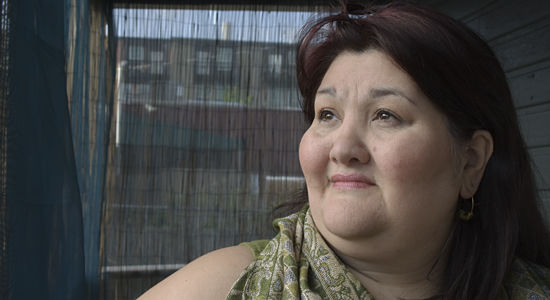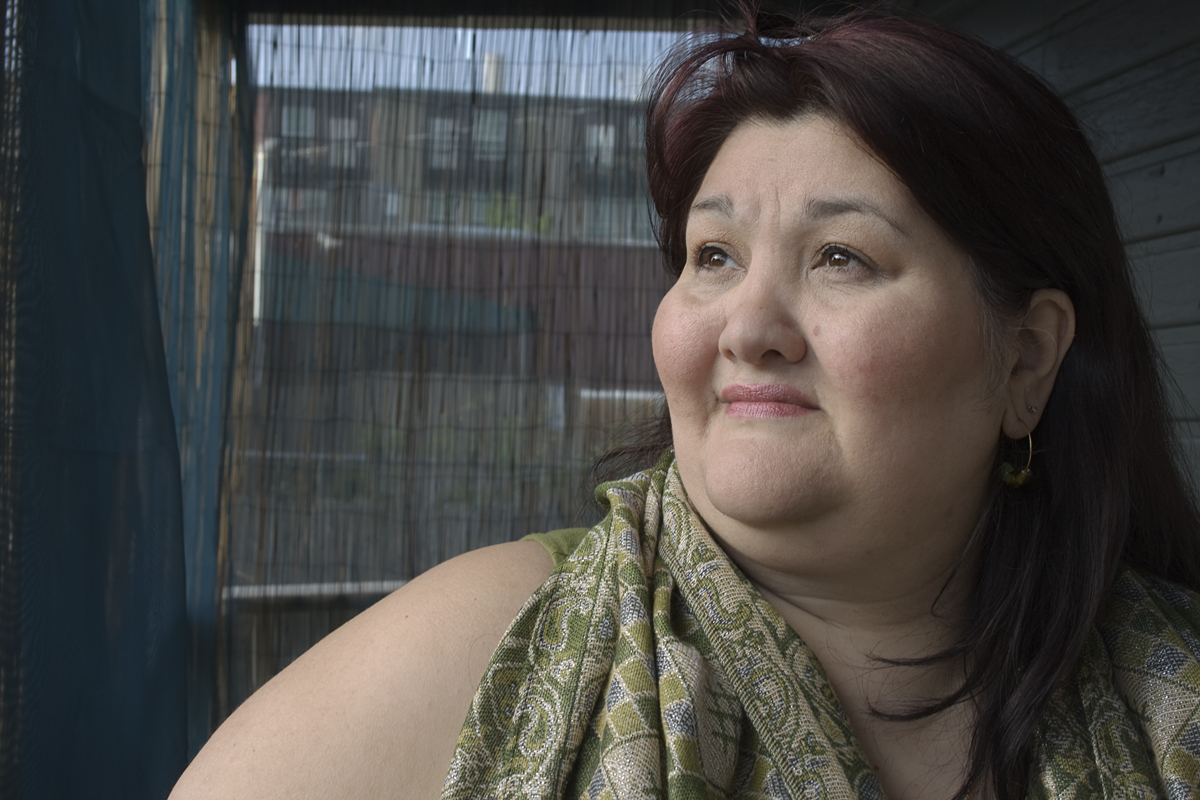Jeri Sundvall-Williams advocates against Portland’s sex industry and fights for legislative reform.
Story by Kelsey Thalhofer
Photos by Ariane Kunze & Sarabeth Oppliger
Multimedia by Ariane Kunze
Jeri Sundvall-Williams races, half-clothed and bleeding, down Milwaukie Avenue in southeast Portland. Cars fly by and she clutches the fanny pack holding her night’s earnings, terrified of the man pursuing her with a knife, equally horrified at the thought of returning home to her pimp empty-handed. “God, if you’re there,” she prays, “I know I messed up my life, but I’ll serve you for the rest of my life if you just get me out of this.”
This was just one of many nightmares Sundvall-Williams, an Oregon native, survived during the five months she spent as a prostitute in 1989. But, for Sundvall-Williams, this particular date would be her last; later that day, her pimp was arrested, freeing Sundvall-Williams from her enslavement. At the time, she thought this escape had happened by chance — she was simply lucky. However, looking back at her story and where it has brought her, Sundvall-Williams says, “I don’t actually believe in coincidences anymore.”
Video
She eventually entered the West Women’s and Children’s Shelter in northwest Portland and began coming to grips with the abuse that had haunted her since childhood. It took years for Sundvall-Williams to realize her continuous victimization stemmed from this abuse, and even longer to transcend her role as victim and become an “overcomer.” Now a dynamic activist against human trafficking and neighborhood coordinator with the Portland Office of Neighborhood Involvement, Sundvall-Williams sat down in Portland with Ethos to discuss her experiences, transition, and projects she’s passionate about today.
Kelsey Thalhofer: Can you give a picture of your life before prostitution?
Jeri Sundvall-Williams: I grew up in Salem; both my parents worked. I got good grades in school, and I was an athlete — basketball and track. It was when I graduated from high school and married at a young age — to someone who turned out to be an abuser — that life started changing for me. I was in that marriage about five years before I got away from him. When I came to Portland to be near family, I was in my twenties with two young children. Because of all the years of being beat up and everything, I had zero self-esteem, and I was just a really good, easy target for a pimp to click onto and force me out on the streets. This was one of the streets. [Motioning to the road.]
KT: Martin Luther King Jr. Boulevard [in northeast Portland]?
JS: Yeah, but at the time it was called Union Avenue. In 1989, it was just this blighted community with practically no businesses on the street. It was a really seedy area, and I’d just walk up and down the street. It was a pretty awful lifestyle. For the most part I was walking up and down 82nd Avenue, which is a much busier street. My pimp’s requirement was that I would make at least $300 a night, or daylight would come and I could come home. So I would go out at 8:00 at night and walk up and down the street and earn money. Well, $300 back then was about fifteen dates. Fifteen dates a night, seven nights a week, is a pretty horrifying thing. His sister is basically babysitting my kids while this is happening and he was giving her crack – she was on crack, she was pregnant with twins. Despite all that, I think she did a fairly good job of taking care of my children. Still, it was an awful, awful situation for all of us. I wasn’t seeing them. I was being locked in the room all day long and then forced out on the streets at night, and it was just a horrible situation.
KT: So you now work for the city as neighborhood coordinator with the Portland Office of Neighborhood Involvement, which overlaps with many of these experiences. What other work do you do to try to spread awareness or help the situation for prostitutes?
JS: I volunteered to sit on the board of the Council for Prostitution Alternatives, because I wanted to give back. Throughout the years I’ve sat on many different boards to help people with different situations. Then one of the members of [Portland’s] Montavilla Neighborhood Association that I worked with fairly regularly came to me and said they were holding a summit on prostitution, and were wondering if I would speak as a survivor. She said, “The neighborhood is all up in arms. Everybody’s angry.” And I’m thinking, “Why would I want to go speak to them?” But I said yes. Because eventually it becomes a call — it’s a calling in your life where you realize, “I went through this and I survived it; that must mean I need to help.” Because a lot of people don’t survive it. A lot of people get stuck somewhere.
KT: Wow.
JS: As I was preparing for these meetings, I was researching to find out where women could go when they needed help. I found that all these services were cut years before. Even on the Multnomah County Web site, there was a listing for two organizations where women could go for help, and if you called those numbers both have been disconnected because both of those organizations no longer exist. So I said, as far as Multnomah County, that they should make current numbers available on their Web site, and Mayor Tom Potter dedicated $500,000 to go to a program to start helping women again. That was an incredible reward for stepping out, for me, that we have some services now.
Right now, there are no shelters to take in women. You could drop into a center, and yet there’s no place, if you want to get away from a pimp, to just take you away and put you in a shelter. So, currently, that’s what we’re working on, and we’re working with Senator Ron Wyden as well, who is bringing, hopefully, a $50 million block grant to create some shelters and help get women off the streets.
We worked on House Bill 3623, which posts a sticker everywhere alcohol is sold. The sticker comes with a letter to people renewing their liquor licenses, asking them to stick it in their window so that people have this 1-888 number to the Polaris Project so they can get out of human trafficking situations. That happened in late April. Now we’re going to stuff envelopes and have a press conference.
KT: What is your personal goal for yourself as an advocate against prostitution?
JS: One is that I work on it for the rest of my life. One of the reasons I went and spoke for the events on 82nd Avenue was that at the time there were three teenage girls who were all being pimped by the same guy, and they were friends of my daughter growing up. You see these little girls all dressed up in little dresses and stuff, and now, ten years later, they’re being pimped by this guy. So I’d like to see a lot of changes. The women, who are already victims generally when they get arrested, are being re-victimized, and yet, the guy who’s pimping them, he’s got them in so much fear that they [the pimps] are not being prosecuted, and generally the Johns, the Drakes, whatever they call them, go free. So I’d like to see a lot more discipline on people’s parts. If it’s not okay to do, then it’s not okay to do across the board.
When you look at prostituted women, 98 percent of them were molested as children. It’s not a job choice that you make because you feel good about yourself. Somebody is using you as a slave, and they’re benefitting, and you’re not. So, I want to see some legislative changes in the way those things are addressed, and I’d like to see a lot more help for folks, especially women escaping prostitution. But we can’t not address the other two pieces. You can’t not address the supply, the women, you can’t not address the pimps, you can’t not address the demand, which is the Johns. We’re not currently doing that, so it’s a lifetime of work.
Listen to another survivor’s story in Finding Freedom in the Paintbrush.









